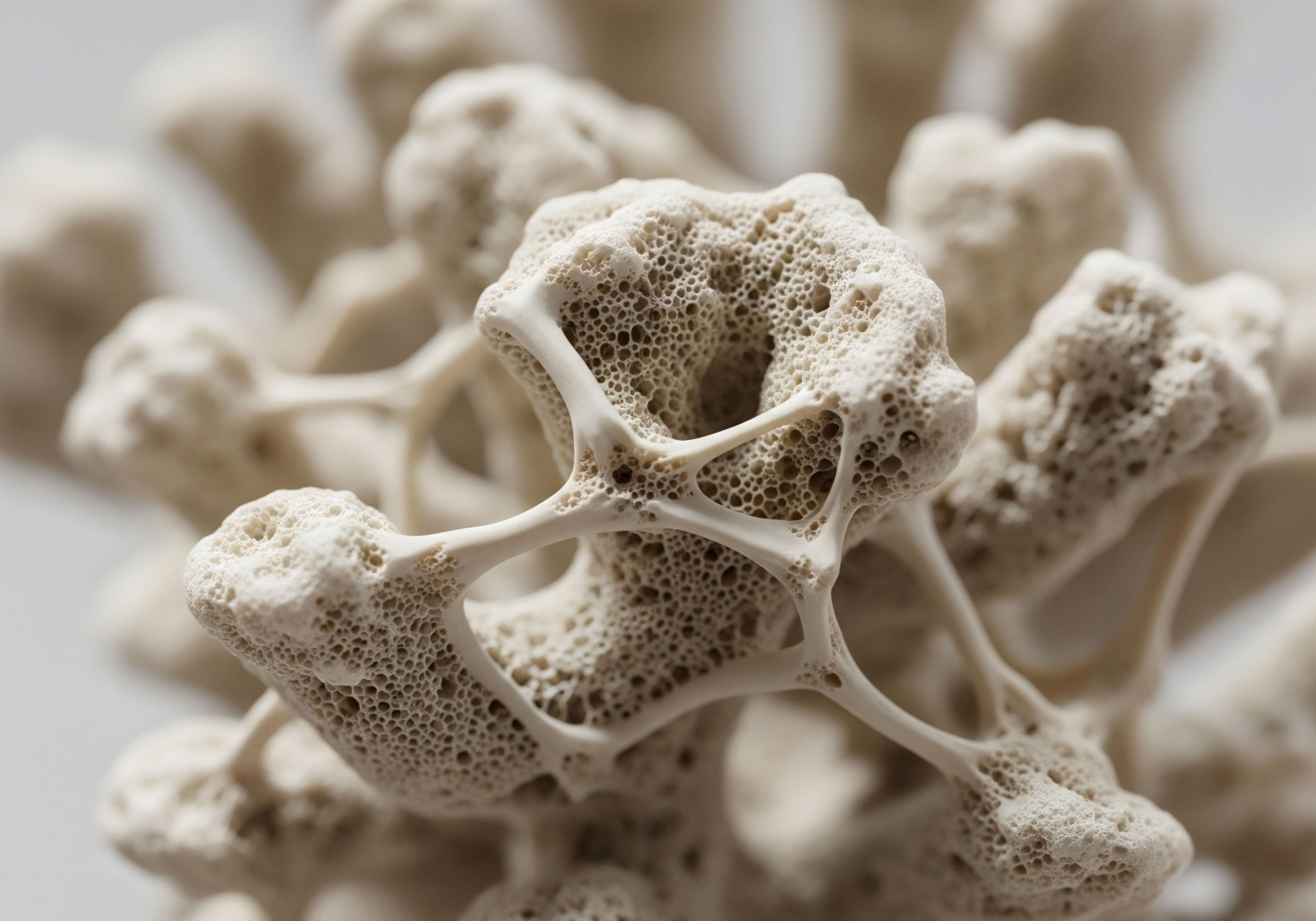

The Biological Blueprint of Declining Vitality
Chronological age is merely a number etched on a calendar; biological age, however, is a dynamic readout of your body’s intricate systems. For too long, the narrative surrounding aging has been one of passive decline, an inevitable march towards senescence. This perspective is fundamentally flawed.
The human body is a marvel of biological engineering, a high-performance system designed for resilience and adaptation. When vitality wanes, it is not a sign of nature’s caprice, but a signal that key operational parameters within this system have drifted outside their optimal range. Understanding why this drift occurs is the foundational step in reclaiming control.
At the core of age-related decline lies a complex interplay of cellular and systemic dysregulation. Cellular senescence, a state where cells cease to divide but remain metabolically active, contributes to tissue dysfunction and inflammation ∞ a phenomenon termed ‘inflammaging.’ Telomeres, the protective caps on our chromosomes, shorten with each cell division, a biological clock ticking towards cellular exhaustion.
Mitochondrial function, the powerhouse of every cell, diminishes, leading to reduced energy production and increased oxidative stress. Glycation, the process where sugars attach to proteins and fats, cross-links tissues, reducing their elasticity and function. These are not abstract concepts; they are the observable markers of a system undergoing entropy, a predictable outcome of biological processes if left unaddressed.
Crucially, the endocrine system, the body’s master regulatory network, plays a pivotal role in this transition. Hormonal equilibrium is paramount for maintaining peak physical and cognitive function, body composition, and overall vitality. As we age, natural declines in key hormones become pronounced.
Testosterone levels in men, and to a lesser extent in women, often decrease significantly, impacting muscle mass, bone density, libido, energy, and cognitive sharpness. Estrogen and progesterone levels fluctuate and decline in women, ushering in menopause with its cascade of metabolic and physiological changes.
Growth hormone (GH) and Insulin-like Growth Factor 1 (IGF-1) levels, critical for tissue repair, muscle synthesis, and metabolic regulation, also diminish. Thyroid hormones, essential for regulating metabolism, can become suboptimal, contributing to fatigue, weight gain, and cognitive fog. DHEA and pregnenolone, precursor hormones for many others, also decline, further compromising the body’s adaptive capacity.
This hormonal recalibration is not merely an incidental aspect of aging; it is a primary driver. It creates a feedback loop where reduced hormone levels can exacerbate cellular dysfunction, increase inflammation, and further impair metabolic efficiency.
The consequence is a tangible reduction in the very qualities we associate with peak performance and youth ∞ robust energy, sharp cognition, resilient musculature, optimal body composition, and a profound sense of well-being. Recognizing these hormonal shifts not as an unavoidable fate, but as adjustable parameters within a sophisticated biological system, is the key insight that redefines our relationship with aging.
It shifts the paradigm from passive acceptance to active optimization, transforming the concept of age from a fixed endpoint to a malleable state.
The decline in key hormones like testosterone and growth hormone is not an arbitrary consequence of time, but a direct contributor to reduced muscle synthesis, impaired cognitive function, and diminished metabolic efficiency, signaling a critical need for systemic recalibration.
The understanding of these biological drivers ∞ cellular senescence, telomere attrition, mitochondrial decline, hormonal shifts ∞ paints a clear picture ∞ aging is a process, not a sentence. It is a cascade of interconnected biological events that, while natural, are profoundly influenced by our physiology and environment.
By understanding the mechanisms at play, we unlock the potential to intervene, to engineer a different trajectory, and to adjust the parameter of age itself. This is the bedrock upon which the pursuit of sustained vitality is built.


Engineering Your Biological Renaissance
With a clear understanding of why vitality can diminish, the imperative shifts to the how ∞ the precise, evidence-based strategies for engineering a reversal of this trend. This is not about cosmetic fixes or fleeting vitality; it is about a profound, systemic recalibration, a strategic optimization of your biological architecture. The approach is holistic, yet demands precision, drawing from endocrinology, peptide science, and advanced metabolic strategies to create a symphony of biological renewal.

Hormonal Recalibration the Master Levers
The endocrine system is the central command center for virtually every bodily function. Restoring its optimal performance is non-negotiable for extending healthspan and peak function.

Testosterone Optimization the Foundation of Male Vitality
For men, testosterone is the cornerstone of virility, muscle mass, bone density, cognitive acuity, and mood. As levels decline with age, the impact is pervasive. Testosterone Replacement Therapy (TRT), when prescribed and monitored by a qualified physician, utilizes various esterified forms (e.g. Testosterone Cypionate, Enanthate) or transdermal applications to restore physiological levels.
The goal is not supra-physiological ‘roid’ levels, but a return to the youthful, robust range, typically 800-1100 ng/dL. This intervention is foundational, often leading to significant improvements in energy, libido, body composition (increased lean mass, reduced fat), and mental clarity.
It’s crucial to manage potential side effects, such as aromatization into estrogen, which may require the judicious use of aromatase inhibitors or careful monitoring of estrogen levels. For those seeking to preserve fertility, or for specific hormonal signaling, Human Chorionic Gonadotropin (hCG) may be used adjunctively to stimulate endogenous testicular function.

Estrogen and Progesterone the Female Vitality Equation
Women’s hormonal landscape is equally critical. The decline in estrogen and progesterone during perimenopause and menopause can lead to hot flashes, vaginal dryness, bone loss, increased cardiovascular risk, and mood disturbances. Bioidentical Hormone Replacement Therapy (BHRT) using custom-compounded estrogens and progesterones mirrors the body’s natural hormones, offering a sophisticated solution.
These therapies can alleviate menopausal symptoms, protect bone density, improve cardiovascular health, and maintain cognitive function. The precise formulation and delivery method are tailored to the individual’s needs, ensuring a safe and effective restoration of hormonal balance.

Growth Hormone and IGF-1 the Repair and Rejuvenation Axis
The Hypothalamic-Pituitary-Gonadal (HPG) axis is complemented by the Hypothalamic-Pituitary-Somatotropic (HPS) axis, governing Growth Hormone (GH) and IGF-1. GH is pulsatile, peaking during deep sleep, and declines significantly with age. It is essential for protein synthesis, tissue repair, fat metabolism, and cellular regeneration.
While direct GH injections are potent, they require strict medical supervision due to potential side effects and cost. A more accessible and often equally effective strategy involves using GH Secretagogues and GH Releasing Hormones (GHRHs).

Peptide Science the Next Frontier of Biological Tuning
Peptides are short chains of amino acids that act as signaling molecules, orchestrating complex biological processes. Their specificity and potency make them powerful tools for targeted optimization.

Growth Hormone Secretagogues and Releasing Hormones
These peptides stimulate the pituitary gland to release its own GH. Examples include ∞
- Sermorelin: A synthetic analog of GHRH, it promotes natural GH release.
- Ipamorelin: A selective GH secretagogue, it also influences cortisol and prolactin minimally.
- CJC-1295: A longer-acting GHRH analog, often combined with a GHRP (like Ipamorelin) for synergistic effects.
- GHRPs (e.g. GHRP-2, Hexarelin): Potent stimulators of GH release, often used in combination protocols.
These peptides, when administered cyclically, can help restore GH/IGF-1 levels closer to youthful ranges, promoting muscle growth, fat reduction, improved sleep quality, enhanced skin elasticity, and faster recovery from injury.

Metabolic and Longevity Peptides
Peptides like Semaglutide and Tirzepatide, known for their GLP-1 receptor agonism, are revolutionizing metabolic health and longevity research. Beyond their well-established roles in diabetes and weight management, they influence appetite, glucose metabolism, cellular protection, and may even activate pathways associated with extended lifespan. Their systemic benefits extend to cardiovascular health and reducing inflammation.

Repair and Regeneration Peptides
Peptides such as BPC-157 (Body Protection Compound) and Thymosin Beta-4 (TB-500) are remarkable for their tissue-healing and anti-inflammatory properties. BPC-157, derived from a human protein, has demonstrated potent effects in healing tendons, ligaments, muscles, and even internal organs, while also protecting against gastric ulcers and neurological damage. TB-500 aids in wound healing, muscle repair, and reducing scar tissue formation. These are invaluable for athletes, individuals recovering from injury, or anyone seeking accelerated tissue regeneration.

Metabolic and Cellular Optimization Advanced Strategies
Beyond hormones and peptides, optimizing cellular energy production and mitigating age-related cellular damage are paramount.

Mitochondrial Support and NAD+ Metabolism
Mitochondria are the engines of our cells. Their declining efficiency is a hallmark of aging. Strategies include supplementing with CoQ10, PQQ, and L-Carnitine. Crucially, Nicotinamide Adenine Dinucleotide (NAD+), a coenzyme vital for cellular energy production and DNA repair, depletes with age. Supplementation with NAD+ precursors like Nicotinamide Riboside (NR) and Nicotinamide Mononucleotide (NMN) can help restore NAD+ levels, enhancing mitochondrial function, cellular repair, and potentially influencing longevity pathways.

AMPK Activation and Autophagy Induction
AMPK is an enzyme that acts as a cellular energy sensor. Activating AMPK, often through exercise or compounds like Metformin (under strict medical guidance) or Berberine, can mimic the metabolic benefits of calorie restriction, improving insulin sensitivity and energy efficiency. Autophagy, the body’s cellular clean-up process, removes damaged components. Intermittent fasting is a powerful, natural stimulus for autophagy, clearing out cellular debris and promoting cellular rejuvenation.

Senolytics and Senomorphics the Emerging Frontier
Senescent cells, which accumulate with age, secrete inflammatory factors that damage surrounding tissues. Senolytics are compounds designed to selectively eliminate these cells, while senomorphics can modulate their harmful secretions. While still an evolving field, research into compounds like Quercetin, Fisetin, and Dasatinib shows promise in clearing senescent cells and mitigating their negative impact on tissue health and aging.
These advanced interventions are not replacements for foundational health practices but are powerful augmentations. Optimal sleep, a nutrient-dense diet, strategic exercise, and effective stress management are the indispensable pillars upon which all these optimization strategies are built. Without them, the system lacks the fundamental support to fully leverage these advanced tools.


Navigating the Timeline of Biological Optimization
The question of when to implement these sophisticated protocols is as critical as understanding why and how. This is not a one-size-fits-all endeavor. Biological optimization is a precision science, demanding a personalized approach grounded in robust diagnostics, strategic timing, and continuous, data-driven evaluation. The era of reactive healthcare is giving way to proactive, predictive, and personalized vitality engineering.

The Imperative of Comprehensive Diagnostics
Before any intervention, a thorough assessment is paramount. This involves more than a cursory check-up; it requires a deep dive into your biological landscape.

Baseline Hormonal Profiling
For men, this includes a full testosterone panel (total and free testosterone), SHBG, LH, FSH, estradiol, and prolactin. For women, comprehensive ovarian hormone assessment (estradiol, progesterone, FSH, LH) is vital, along with thyroid panel (TSH, Free T3, Free T4, TPO antibodies). DHEA-S and pregnenolone levels should also be considered. These baseline levels provide the critical context for any subsequent intervention, revealing specific deficiencies or imbalances that need addressing.

Metabolic and Cardiovascular Health Markers
Assessing metabolic health involves evaluating fasting glucose, HbA1c, fasting insulin, lipid profiles (including particle size and Lp(a)), and inflammatory markers like hs-CRP. Cardiovascular health can be further elucidated with CIMT (Carotid Intima-Media Thickness) or CAC (Coronary Artery Calcium) scoring, providing a true picture of vascular age.

Genetic Predisposition and Biomarker Analysis
Advanced genetic testing can reveal predispositions to certain age-related conditions or how individuals metabolize specific compounds. Tracking key biomarkers over time ∞ such as Vitamin D levels, homocysteine, B12, ferritin ∞ provides a granular view of your physiological status and allows for early detection of potential issues.

Strategic Implementation Phases
The introduction of optimization protocols typically follows a phased approach, prioritizing foundational elements and then layering more advanced interventions.

Phase 1 Foundational Pillars (immediate & Ongoing)
This phase is non-negotiable and begins immediately. It involves optimizing sleep hygiene (aiming for 7-9 hours of quality sleep), implementing a nutrient-dense, whole-foods diet tailored to individual metabolic needs, establishing a consistent exercise regimen (combining resistance training, cardiovascular work, and flexibility), and developing robust stress management techniques. These are the bedrock upon which all other interventions succeed. Without them, advanced protocols will yield suboptimal results and may even carry increased risk.

Phase 2 Hormonal Restoration (once Foundations Are Solid)
Once foundational health is established and baseline diagnostics are complete, hormonal recalibration can commence. For men, TRT might be initiated if levels are clinically low and symptoms are present. For women, BHRT would be considered based on menopausal status and symptom profile. Thyroid optimization, if indicated, would also be addressed here. This phase typically requires several months to stabilize and for the body to adapt, with ongoing monitoring every 3-6 months.

Phase 3 Peptide and Advanced Metabolic Support (layered Introduction)
Peptide therapies and advanced metabolic support like NAD+ precursors are often introduced after hormonal balance is achieved or in conjunction with it, depending on specific goals and individual response. For instance, GH secretagogues might be cycled to enhance GH/IGF-1, or metabolic peptides introduced for broader systemic benefits. The timing and combination of peptides are highly individualized, often guided by specific performance goals, recovery needs, or longevity objectives. This phase requires careful attention to dosing, cycling, and potential interactions.

The Timeline of Transformation
The expectation of results must be realistic and aligned with biological processes.
- Weeks 1-4 ∞ Initial Adaptation & Symptom Relief. Many individuals report improved sleep, mood, and energy levels within weeks of initiating TRT or BHRT. Initial water retention or minor shifts in body composition may occur.
- Months 1-3 ∞ Systemic Rebalancing. Hormonal therapies begin to exert more pronounced effects. Lean muscle mass may increase, fat mass may decrease, and cognitive clarity sharpens. Peptide therapies may start showing effects on tissue repair or metabolic markers.
- Months 3-6 ∞ Peak Efficacy & Stabilization. Hormonal levels stabilize within the target range. Body composition changes become more evident. Peptide benefits in terms of recovery, performance, or cellular health become more pronounced. This is often when optimal therapeutic dosages are identified.
- Months 6+ ∞ Sustained Optimization & Refinement. The focus shifts to long-term maintenance, ongoing monitoring, and subtle adjustments based on evolving biomarkers and individual response. Periodic deep dives into diagnostics (e.g. annual advanced panels) are crucial.
The journey of biological optimization is not a sprint but a marathon, demanding patience, discipline, and an unwavering commitment to data. It is about understanding that when you implement these strategies ∞ after establishing foundational health, with appropriate diagnostics, and within a personalized, phased approach ∞ determines the efficacy and safety of your pursuit. This intelligent timing transforms potential interventions into powerful tools for mastering your biological future.

The Dawn of the Optimized Self
We stand at a precipice of human potential, where the perceived inevitability of age-related decline is being systematically dismantled by scientific inquiry and technological advancement. The concept of ‘age’ is no longer a fixed, chronological sentence, but an adjustable parameter within the sophisticated operating system of the human body.
By understanding the intricate mechanisms of aging ∞ from cellular senescence to hormonal recalibration ∞ and by wielding the precise tools of modern endocrinology, peptide science, and metabolic engineering, we gain unprecedented agency over our biological destiny.
This is not about chasing an elusive youth, but about cultivating an enduring state of peak performance, cognitive sharpness, and profound vitality, extending the period of life where we are most capable, most engaged, and most fully ourselves. The future is not one of merely living longer, but of living better, longer ∞ a testament to our capacity to engineer our own biological renaissance.

Glossary

biological age

senescence

body composition

estrogen and progesterone

growth hormone

hormonal recalibration

peptide science

cardiovascular health

gh secretagogues

longevity pathways

cellular rejuvenation




